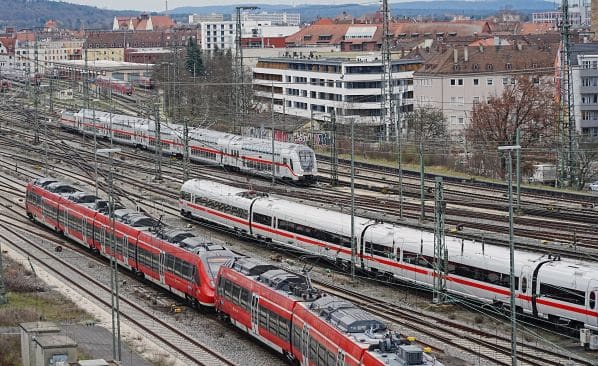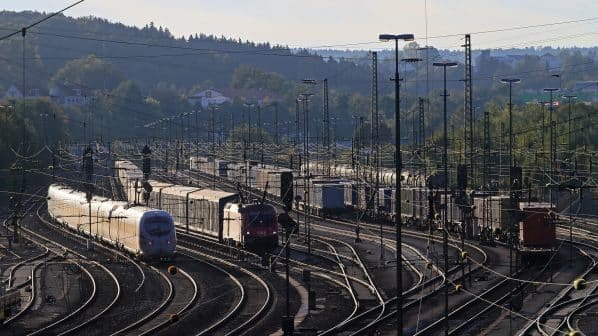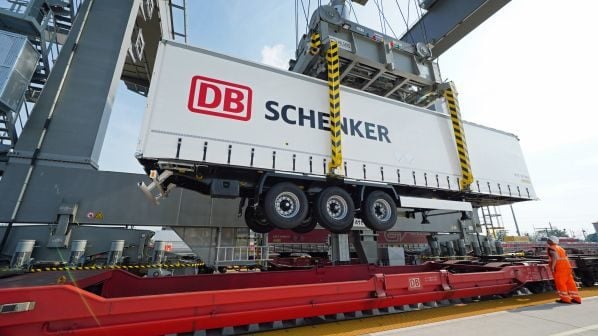GERMAN Rail (DB) returned to the black in 2022 after suffering losses “amounting to billions of euros” in 2020 and 2021 due to the Covid-19 pandemic.
“Despite burdens faced in passenger transport due to the impact of Covid-19, the war in Ukraine and a steep rise in inflation, DB Group closed the 2022 financial year with a clear operating profit,” says DB. “Operating profit (adjusted Ebit) improved in comparison with 2021, which was heavily affected by Covid-19, by around €2.8bn to almost €1.3bn.”
DB also says total revenue in 2022 grew by 19.1% compared with 2021 to around €56.3bn, which it says is the highest ever recorded.
DB attributes its turnround in 2022 to strong demand in passenger transport and improved performance of its logistics subsidiary DB Schenker, which achieved its highest ever operating profit of around €1.8bn - almost 50% more than in 2021.
“DB Schenker is a success story with a strong position in all the relevant industry sectors,” says DB’s CFO, Dr Levin Holle. “With the transformation programme that DB Schenker launched in 2022, it is setting the way for more steady growth. DB Schenker has the potential to continue delivering excellent results in the coming years.”
However, DB’s supervisory board instructed DB in December to draw up options for the sale of DB Schenker to help reduce overall debt, which stood at €28.8bn on December 31 2022, a slight improvement over the debt level at the end of 2021.
In contrast, rail freight subsidiary DB Cargo continued to remain in the red, with an operating loss of €600m in 2022 despite an increase in revenue. DB says DB Cargo suffered particularly against a backdrop of difficult operating conditions and additional costs.

DB says that when the Covid-19 pandemic started to subside, passengers quickly returned to rail, with about 2 billion passengers using DB trains in 2022, an increase of 40% over in 2021.
DB Long-Distance carried around 61% more passengers in 2022 than in 2021 and increased revenue by more than €2bn to about €4.8bn. This compares with a revenue increase of almost €1bn by DB Regional.
Passenger kilometres grew by around 63% to 82.6 billion. “This was partly thanks to the 9-Euro-Ticket, of which 52 million were sold in total across the German transport sector last summer,” DB says.
“Climate-friendly mobility is booming,” says DB’s CEO, Dr Richard Lutz. “Demand is good and is continuing to grow strongly. We may well set a new record in 2023, with significantly more than 150 million travellers on our long-distance trains. That is energising us to deliver improvements as quickly as possible to give Germany the more efficient and punctual rail system it deserves.”
Train-path kilometres rose by 2.2% in 2022 to 1.13 billion. “The rail network is, therefore, under more strain than it was before the Covid-19 pandemic,” DB says. “It is too old, too failure-prone and has too little capacity. As a record number of modernisation and construction measures were being carried out across Germany in the reporting period, DB trains were less punctual than ever before in 2022, with only 65.2% of long-distance trains arriving on time compared with 75.2% in 2021.
“The past year marked a turning point,” Lutz says. “It became clear to everyone involved that we have to switch course and approach infrastructure renewal and modernisation completely differently.”
Capital expenditure increased by 6.4% in 2022 to €6.8bn, while gross capital expenditure, which includes grants by the German government, reached €15.4bn.
In 2022, DB’s pre-tax profit improved by €1.73bn compared with the loss in 2021 to €932m. However, DB made an after-tax loss of €227m compared with a €900m loss in 2021 and a huge loss of €5.7bn in 2020.
Gloomy outlook
“In the 2023 financial year, the very high energy costs and much inflated purchase prices will be a burden on DB Group’s development,” DB says. “In addition, the extremely high freight rates are expected to normalise further across the logistics industry.”
“In the difficult conditions of 2023, we must take care to balance DB Group’s expenses and income in an economically viable way,” Holle says. “This includes concluding sensible collective bargaining agreements that the group can afford.” Holle says productivity needs to be improved in order to realise the urgently needed expenditure to increase capacity and improve punctuality.
Due to the high rate of inflation and the pre-financing of billions of euros needed to upgrade the infrastructure, DB says that it will make an operating loss of around €1bn this year. Revenue is forecast to exceed €56bn in 2023. DB expects gross capital expenditure to rise to more than €18bn and net capital expenditure to exceed €8.5bn. As a result, net financial debt will probably grow to more €33bn. “Volatile market developments mean that all forecasts are subject to a high degree of uncertainty,” DB cautions.



